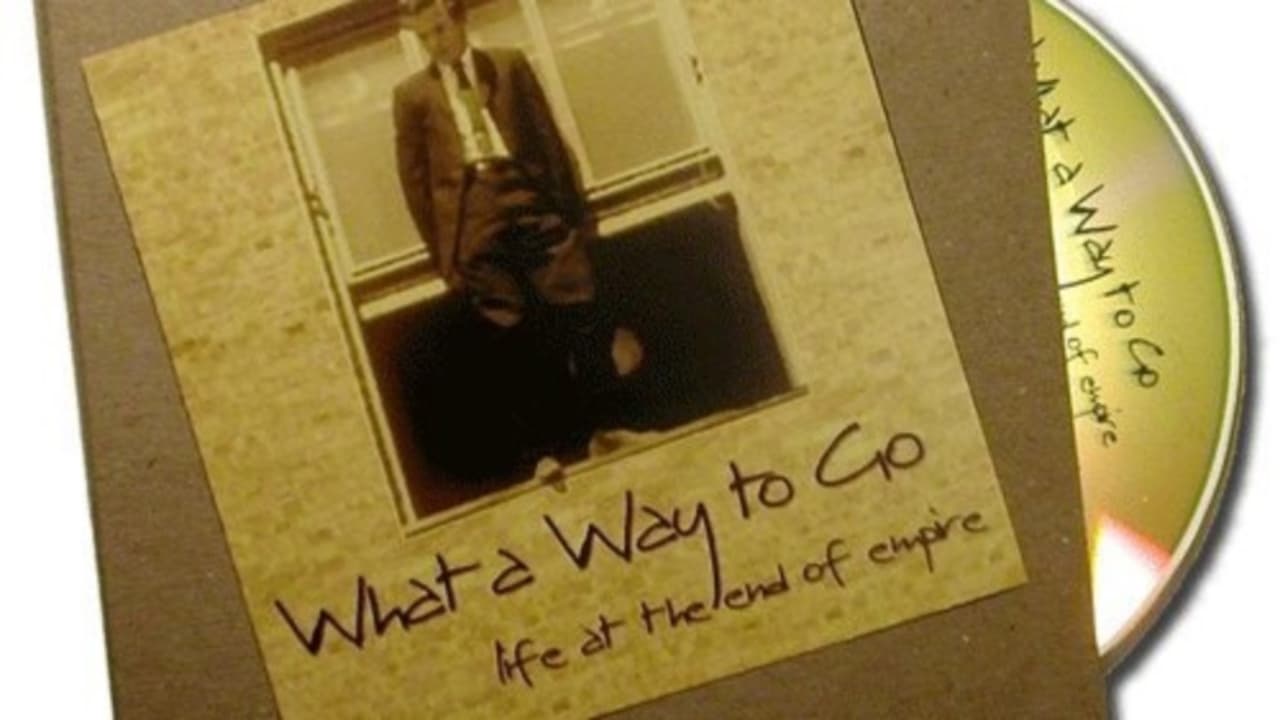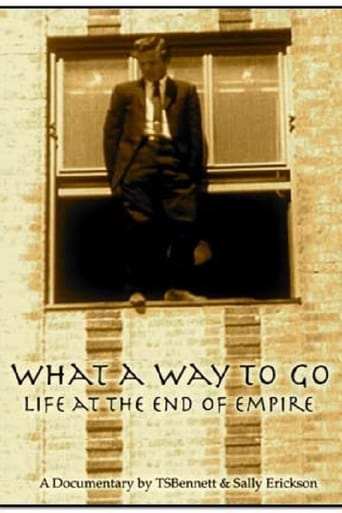Btexxamar
I like Black Panther, but I didn't like this movie.
Acensbart
Excellent but underrated film
Keeley Coleman
The thing I enjoyed most about the film is the fact that it doesn't shy away from being a super-sized-cliche;
Beulah Bram
A film of deceptively outspoken contemporary relevance, this is cinema at its most alert, alarming and alive.
MrMajestik
This doc just supports and solidifies what I already have learned, observed, researched, pondered, read, and realized for the last 30 years... And sadly, no, Jesus is not coming to save us! The only thing that keeps me from laughing and stating the proverbial "I told you so," is the fact I have a 6 1/2 year old son (who I love much more than Jesus), he breaks my heart with his love and concern for the planet already, asking and reminding me to recycle... while I know that unchecked population growth and capitalism will destroy what once was a unique and beautiful planet, and likely leave him a unpleasant future. We have only ourselves to blame...
leycec
Conceivably, WaWtG:LatEoE (or, "whatgulateoe") is the most important film of our time. As other reviewers comment, it is not necessarily the most well-crafted film. It isn't. The editing is flawed; the pacing, disjoint.What it is, however, is the most ruthlessly honest film ever put to cinematography. From the earnest poetically hushed script-writing and narrator delivery to the relentless, factual interviews with scientific luminaries, authors, and journalists, WaWtG:LatEoE weaves the sordid story of... collapse. From the weft of everyday intuition and despondency, it incrementally and with examined force unravels the mass predicaments of industrial civilization. In no order, these are:* Peak oil. Global oil production peaked at 74.87 mbpd (million barrels of oil per day) on July 11th, 2008 - our so-called "Peak Oil Day," in hindsight.* Climate change. (I don't believe we need to discuss this one...)* Biodiversity loss. Anthropogenic species extiction is roughly 10,000 times the background rate, at an estimated 100 species per day. By contrast, the sum number of distinct species on Earth is estimated at only 10,000,000 species. Do the math.* Human overpopulation. The human population is currently growing at 94,000,000 humans annually. Human population growth has obeyed an exponential curve for the past 13,000 years: the so-called "Holecene." Unfortunately for the human population, the Earth is a finite planet.* Economic depression. At the tail end of quarter one of 2010, gross sovereign debt of the United States of America is an estimated 87.3% of GDP. If you think this is a sustainable trajectory, I have a Nigerian banker who would like to speak with you.In sum, the prognosis is bleak. If the 20th century was the Age of Exuberance, the 21st century will, with all likelihood, be the Age of Consequences. And the unpaid debt on those consequences is coming due.Humbly yours, Cecil Curry [ http://raiazome.com ]
Wisetroll
Now aside from the director's glum sounding narration (and with the gravity of the subject is warranted) this film is very engaging and thought provoking. Unlike Leonardo DiCaprio's 11th Hour and Al Gore's Inconvenient Truth, this film delves deep into why no technology will save us from the impending collapse of industrial civilization. The director focuses on four main crises: Peak Oil, Climate Change, Mass Extinction, & Population Overshoot. Among other things you'll learn: How oil is embedded in our food production and when it's gone so is our food; How extinction rates are one thousand times greater than normal background extinction rates; How agriculture itself is inherently unsustainable; How earth can only support one billion humans without petroleum; How the myth of the technofix keeps everyone believing in a "happily-ever-after" scenario that won't come true. This film gets ten out of ten for it's level-headed approach to what could possibly be the end of our domination of the earth. It is REQUIRED viewing for anyone concerned with humanity's future.
tonywebman
I gave this movie 10 out of 10 not because it is a great documentary or because it is written so well or because of the editing, etc. but because IT CONTAINS THE MOST IMPORTANT INFORMATION THAT YOU MAY EVER FIND IN A DOCUMENTARY! This does not mean it is a pleasant experience. On the contrary, I don't think most people can handle what this move has to say. It is an unflinching look at the dominant culture currently in place on Earth and how we are on a collision course with the destiny of our own making.This movie is similar to "An Inconvenient Truth" in that it discusses climate change but it also talks about Peak Oil, Population Growth and Mass Extinction. Do you think that this is all bullsh*t? See the movie, read up on the people who were interviewed and what they have to say. Read Ismail by Daniel Quinn, read anything by Derrick Jensen. Make up your own mind, talk to people about what this movie has to say.This is the most important thing you can do with you time. Drop everything, find a copy of this movie and watch it now! No, I'm not associated with the film-maker. I just watched this film and it blew me away!

